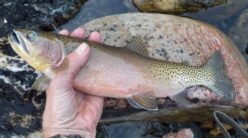Several years ago, my son and I were hunting in an area that was really remote. It had taken from 4 to 7 a.m. to hike into an area that pre-season scouting indicated we would find several mule deer bucks. We spent the rest of the morning waiting in the rocks above a small meadow watching does and a spike buck grazing just outside the tree line.
At about 11 a.m., we saw a more mature buck cross the meadow, chase the spike buck off and then disappear into the tree line. We thought we had a pretty good idea where he was going, so we decided to stay high and skirt around to the other side of the meadow and see if we could get a shot at him.
As we got up to move around the other side of the meadow, all the does bolted into the tree line. At first we thought they had seen us but decided that we were far enough away, and inside of the tree line, that we shouldn’t have spooked them. As we were looking to see if we could see what had startled them, a lone hunter came into the meadow, seemly unable to walk a straight line, but kind of staggering from one side to the other. My son Mike, was the first one to say what we both were thinking, “I think that guy is in trouble.”
We forgot about the buck and started down the hill calling to him. He finally turned and acknowledged us and stood there until we reached him. He immediately asked if we had seen his father.
He was sweating profusely, which made us think he had been walking nonstop for some time. He also was dizzy and was having trouble keeping his balance. so we had him sit down before he fell down.
I thought he also looked dehydrated so I looked for his water bottle or canteen in his backpack. There was none, so Mike pulled a water bottle out of his day pack and proceeded to have him sip water for a few minutes. After about 30 minutes and an energy bar plus both Mike’s water bottles and one of mine, he was a little more coherent and told us that his father and he had left their car about where we had left our truck the night before and had gone around different sides of the mountain expecting to meet at a place near our camp. He said neither his father nor he was carrying any water or food because his father said they wouldn’t need any.
It was obvious to us that the man was lost, had wandered aimlessly and had become disoriented and dehydrated, while heading farther away from where his father expected him to be.
Mike’s cellphone didn’t have any reception in the meadow so Mike carried his backpack and we both helped him back to our camp making him rest at intervals along the way. By the time we got back to camp, he had finished my second bottle of water and half of another energy bar. We still had no cellphone service.
I thought he still looked like we ought to get him checked out at a medical facility in Soda Springs, but his father was waiting for him at our camp where he had helped himself to a couple of bottles of water in the bed of our truck.
His father said he would take his son home to Pocatello and have him checked out at the hospital if he was still dizzy when they got home.
That experience has always haunted me because if we hadn’t seen that guy, he would have continued staggering and would have collapsed somewhere his father wouldn’t have thought to look for him.
However, Some very important lessons were reinforced on my mind that day.
1. Always hunt with someone.
2. Learn to use a topographical map, GPS and compass and carry them with you always.
3. Carry a small flashlight and extra batteries and bulbs in case it gets dark on the way back. Flashlights that emit 70 lumens or more are easier for others to see up to a mile away.
4. Pick out landmarks that are easy to see to guide you back to camp or your vehicle.
5. Your body can’t function properly if you don’t feed it. Carry a bag of raisons, nuts, M&M candy and dried fruit along with water.
6. Wear a pack with matches, firestarter materials, clothing, food, water and a light tarp that can be used for shelter.
In addition, leave word with someone where you are going and when to expect you back.
Always be prepared for changes in weather or unanticipated delays when hunting or camping and hiking in the backcountry, and as the shift sergeant on the old NYPD Blues used to say, “Let’s all be careful out there.”
Smokey Merkley was raised in Idaho and has been hunting since he was 10 years old. He can be contacted at mokeydo41245@hotmail.com.



